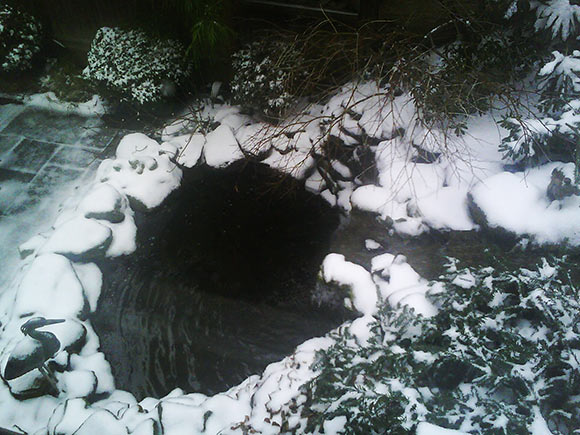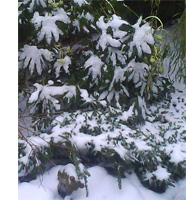
Preparing Your Garden for Winter
Please be aware of these tasks:
If we don’t get an inch of rain a week, I turn on the water for a good, deep soak. This is important going into the Winter because when the ground freezes hard, plants cannot absorb any water into their systems. As the Winter winds blow, moisture is whipped out of the plants and there is no way for them to replace it. This is the cause for Winter-burn and consequently, death, if the freeze goes on long enough and the plants were already dry. Fall watering “plumps them up” and helps to protect them against Winter-burn. When the ground does freeze finally, though, don’t forget to turn off your outdoor faucets from inside the house and drain them so your pipes don’t freeze! Irrigation systems should be professionally blown-out, drained, and turned off for the Winter to protect from damage. In addition, bring in your hoses. Ceramic pots can freeze, swell and crack, too—unless you have the frost-proof kinds--so don’t forget to store or cover them.
 Be sure to gently knock off any snow from your flexible plants, such as Boxwoods and Waxmyrtles, to prevent breakage. Do not tryto knock off ice (or pour hot water on your plants to melt it!). Let it melt naturally and fall on its own. The stems are extremely brittle when covered with ice. What I learned from the heavy, heavy snows and ice of recent Winters: Let Nature take its course. I tried to knock off the snow early on; eventually, however, I just let the snow pile up and enclose the plants. Then I left them alone. I made this decision after I tried to get proactive and knock off some heavy snow from a big Boxwood branch—the branch had iced underneath the snow and the whole thing cracked off when I shook it too hard. Lesson learned--and I went inside. What else I learned: After a good pruning and some time, all my plants recovered from breakage and look great now. Be patient.
Be sure to gently knock off any snow from your flexible plants, such as Boxwoods and Waxmyrtles, to prevent breakage. Do not tryto knock off ice (or pour hot water on your plants to melt it!). Let it melt naturally and fall on its own. The stems are extremely brittle when covered with ice. What I learned from the heavy, heavy snows and ice of recent Winters: Let Nature take its course. I tried to knock off the snow early on; eventually, however, I just let the snow pile up and enclose the plants. Then I left them alone. I made this decision after I tried to get proactive and knock off some heavy snow from a big Boxwood branch—the branch had iced underneath the snow and the whole thing cracked off when I shook it too hard. Lesson learned--and I went inside. What else I learned: After a good pruning and some time, all my plants recovered from breakage and look great now. Be patient.
I never leave liquid garden chemicals out in the shed where they can freeze. It can ruin them. I put them in my utility room, on a high shelf, out of the sun. They should be in a cool, dry, frost-free storage spot. The main thing is to store them safely out of the reach of children and pets, and others who may not know what they are grabbing. Always read the labels (you should be doing this, anyway, for everyone’s safety)—they will always tell you about storage. And check those expiration dates—safely and properly discard the expired chemicals if out of date.
Next story > The Year in Our Gardens
